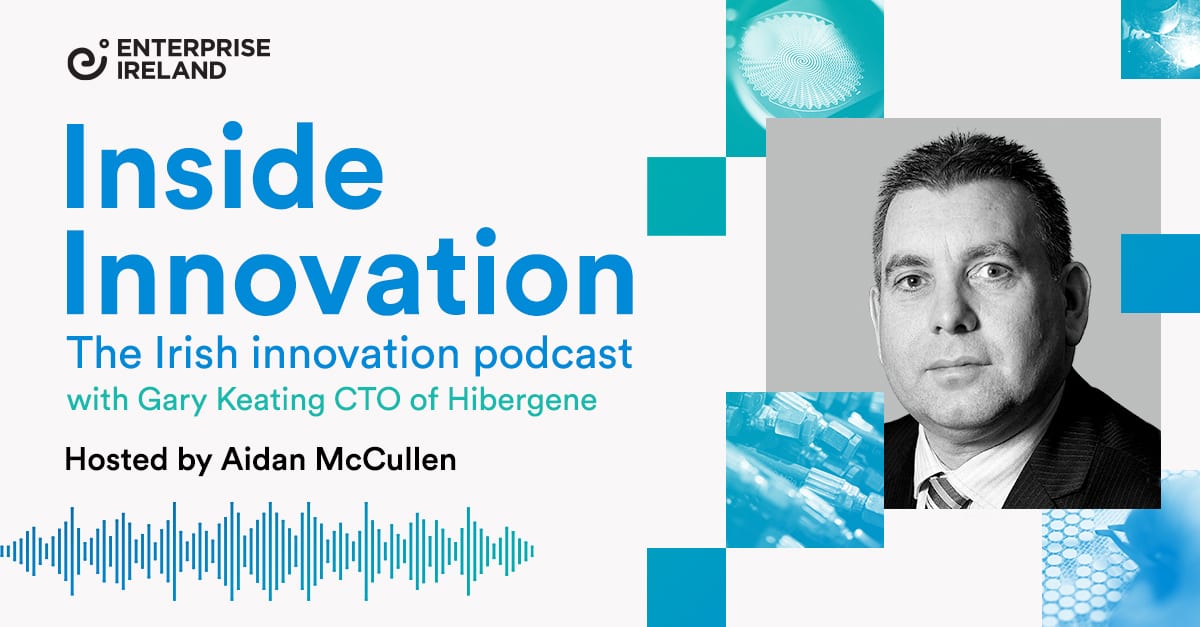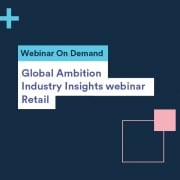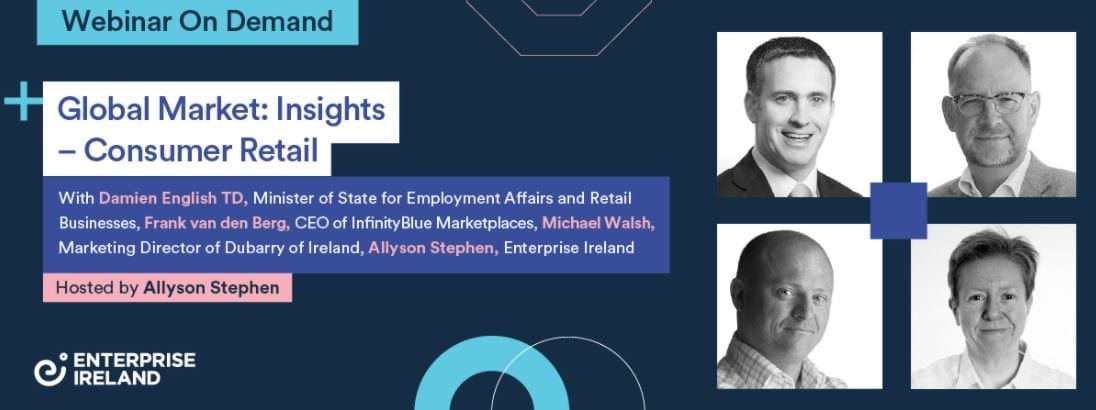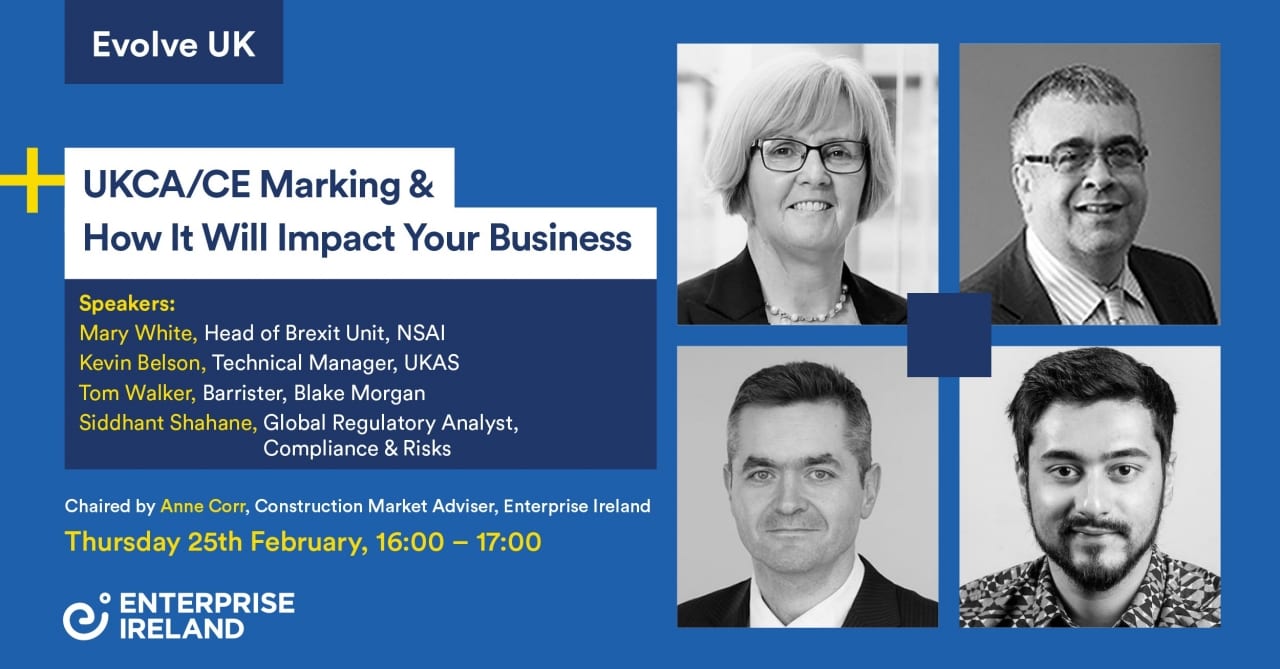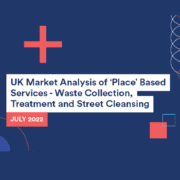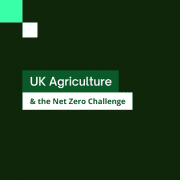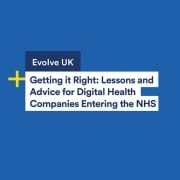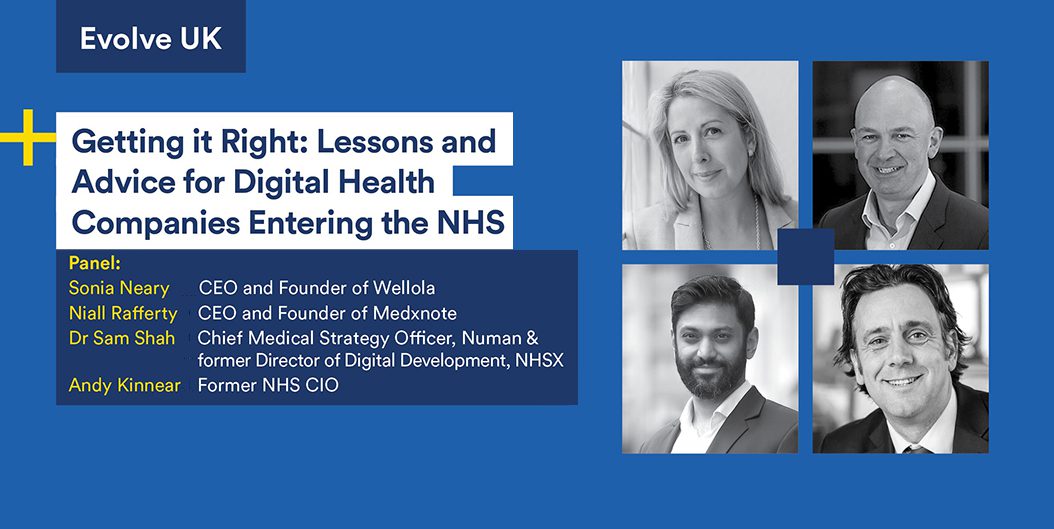Digital communication – the key to success in North America in the context of Covid
The ongoing Covid-19 global pandemic has thrown up many challenges for companies worldwide. For Irish companies exporting to North America, these challenges have varied widely from sector to sector, but some, such as remote working, communication with clients, difficulties in finding new business, establishing sales pipelines and cash flow issues have been identified as common. As such, a basic roadmap to recovery has been drafted by Enterprise Ireland (EI) to help companies navigate through this uncertain time.
“The roadmap is a framework,” says Sean Davis, Regional Director for North America at EI, “but what’s interesting is that it extends across many, if not all sectors.”
There are three stages to the roadmap, and it’s backed up by EI supports to get companies into stages two and three:
- Stabilise – protect your business, maintain operations and retain employees
- Reset – adapt your business, plans and operations to new conditions
- Recover – Restart innovation and capitalise on early demand as recovery develops
Communication is key
One major issue that affects every stage of the framework is communication. Many companies found themselves scrambling to deal with a workforce that suddenly became remote. Face-to-face meetings became impossible, and in the North American market, different time zones and inability to travel became massive issues for Irish companies – and so setting up successful and secure online communication technologies became key.
Dr Martyn Farrows, COO of Soapbox Labs, explains that the communication issue is not just an internal problem, but also extends to your customers and potential clients. “For us, as an online business, we were very comfortable with using many of the technologies available to us, such as Slack, as we had already had them set up internally. That situation was put into very stark contrast with the market. Our business has a very regular 12-month rhythm as we do a lot of work with the education sector, so when this kicked off in February/March, we were right into our development phase and two very big customer networking events in North America were cancelled as a result of Covid. So we had to react very quickly as to how we could communicate with our clients and how we could support them as they adapt to a remote learning environment.”
But there are positives. Because this is a global problem, everyone has the same communication issue – and Sean explains that in a way it’s a great leveller for companies, as location becomes less of an issue when face-to-face meetings are not possible for anyone. “We also had a good call with Professor of Innovation and Entrepreneurship at the Kellogg School of Management, Northwestern University. Following research work with a large number of North American companies, the conclusion is that we’ve actually crossed the digital rubicon in terms of our movement towards digitalisation and this new virtual environment.
“Maybe one of the benefits of Covid has been that push of the technological envelope, leading companies to utilise technology in a more utilitarian way.”
Adapting your business
For every company, there is a real need to adapt to the new market conditions, and answer any individual challenges that present themselves to the company. John Power is the CEO & Managing Director of Aerogen, a company that manufactures the only product that delivers drugs via a closed-system aerosol on ventilated patients, so he experienced great demand as the crisis took hold. “In the second two and a half weeks of March we received orders equivalent to the orders received in the first half of last year. But that meant we had to ramp up our manufacturing at a time when the world in many ways was shutting down. For instance, a lot of our product is shipped globally on passenger planes but when they were grounded, we had to look for capacity on cargo planes. It was a very challenging time and we had to manage expectations to make sure everyone was getting what they needed to keep them going.”
For Martyn, too, there was a need to adapt quickly. “We have just launched a first-of-its-kind voice-powered assessment tool to help educators understand and accelerate literacy development for remote learners in the US. That is an interesting case study as we signed the contract in January 2020 for delivery in August 2021. In May, the customer floated the idea that they’d like to speed up development to bring it in this year to address needs created by Covid. Now there are 150,000 kids able to access that product for their learning, growing to 2 million in the next two years. This is a good example of needing to be agile, needing to adapt to your customer’s needs as they try to respond to the needs of the market.”
Both John and Martyn agree that the key to rising to such challenges is being sensitive to your staff’s needs, especially in such uncertain times when staff members may be dealing with virtual working challenges, stress and worry about illness, and children at home from school. “You have to manage things very carefully and set clear expectations,” says Martyn. “Our team has been amazing and adapted extremely well, but a lot of that is down to effective communication.”
Preparing for the future
While stabilising and adapting your business is key to survival, to keep trading once the crisis is over, preparation for the future is vital. And again, finding new ways to communicate is extremely important.
“In the medtech industry, our usual method of opening new accounts would be to meet the people and demonstrate our products,” says John. “Obviously that has been disrupted now as hospitals don’t want people coming off the street amid the restrictions. We’ve had to develop more online training, online webinars and keynote speeches to try and attract a pipeline for the future that way.”
Both Martyn and John agree that to succeed in the North American market, preparation and flexibility are needed. “We did a lot of research into the market and were fortunate to get a Market Discovery Fund grant approved through EI, which was pivotal for our entry into the market,” says Martyn.
“It’s all about preparation; there is no such thing as an overnight success in the US market.”
“Our modus operandi at EI over the past 30+ years has been to cultivate the client/buyer relationship,” says Sean.
“With the opening of our Montreal office, we will have eight offices across North America. I would advise any client company to get in contact with our local manager and market adviser for help during this time. We have had the same communication issues as our clients, but we’ve moved quickly to adapt so we can continue to nurture those client-buyer relationships.”
So what will be the future for Irish companies operating in North America? “At the start of this crisis, you couldn’t over-communicate, everyone wanted information,” says Sean. “But as it started to move through its different phases, we’ve moved more into trust and delegation. There will be a certain snap-back once we start to get back to normal and a certain amount of personal interaction will come back. On this point, there is a distinct difference between the US and Canada, as in Canada, those personal relationships are very important – which is why we have two offices there now.
“There has always been a cultural affinity between America and Ireland – but there are a lot of domestic NA companies that will be dusting themselves off and looking at the opportunities within the region – of which there are plenty – and they may be taking advantage of the huge markets on their doorstep to help them recover. That will be a future challenge for our clients.”
Evolve UK Podcast – Women in Construction

Enterprise Ireland’s Evolve UK podcast series shares market insights to help Irish businesses identify opportunities across the UK.
The ‘She Built That’ initiative was launched to highlight the real influence that women have in the Construction sector. As an industry so often criticised for its lack of diversity, this event highlighted the achievements of women in the sector and looked to inspire the next generation of great women in construction.
One year on, Conor Stone and Kevin Fennelly sit down with the minds behind the initiative, Anne Corr and Niamh Kearney, to discuss the ideation, the execution and the impact of ‘She Built That’.
Global Ambition – Industry Insights: Retail webinar
Enterprise Ireland hosted a series of Global Ambition – Industry Insights sector focused webinars to deliver market intelligence on the evolving international export opportunities across global markets.
This Retail webinar discusses:
-
The global opportunity for online retail, both now and longer term
-
Routes to market and regional differences
-
Implications for Irish brands and how to capitalise on the online opportunities
Hosted by Enterprise Ireland’s Allyson Stephen with expert insights from
-
Frank van den Berg, CEO of InfinityBlue Marketplace
-
Michael Walsh, Marketing Director of Dubarry of Ireland
Watch the webinar here.
UKCA/CE Marking & How It Will Impact Your Business
The webinar, UKCA/CE Marking & How It Will Impact Your Business, discussed the UKCA (UK Conformity Assessment) mark – the new UK product marking that will be required for certain products being placed on the market in Great Britain (England, Wales and Scotland). It covers most products that previously required the CE mark and will be relevant to many of our clients that export products to the UK.
The UKCA marking came into effect on 1 January 2021. However, to allow businesses time to adjust to the new requirements, you will still be able to use the CE marking until 1 January 2022.
This webinar will be helpful to anyone who wants to understand the complex requirements for UKCA marking and will focus on:
-
Accreditation and Designation of Approved Bodies including UKAS’s role
-
UKCA marking and the law: what you need to know
-
The marking and requirements for Northern Ireland
-
Trading with the UK: Product Regulatory Requirements and implications for the supply chain
UK Market Analysis of ‘Place’ Based Services – Waste Collection, Treatment and Street Cleansing
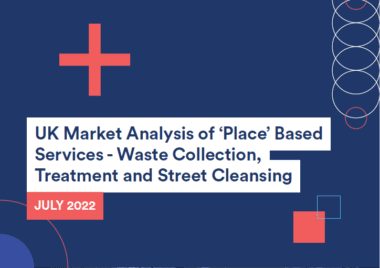
This report provides details of how local authorities work and where Enterprise Ireland’s client companies should focus efforts to win work and develop a sustainable profitable foothold in the UK. The report focuses on two specific areas:
• Understanding the UK local authority landscape, including the types of local authorities, the roles and responsibilities of elected Members and officers and how they fit in with the decision-making process of procuring the type of ‘place based’ services offered by Enterprise Ireland client companies.
• Undertaking market analysis to identify the local authority procurement horizon/ pipeline for ‘place’ based services, focussing on waste collection, treatment and street cleansing services.
Read the report here.
The Nordics: Opportunities abound for ambitious Irish exporters
As an island nation, the export economy is essential for the health and growth of Irish companies. Our reputation for innovation and entrepreneurship has served us well in that regard, with Irish companies finding huge success in every corner of the world. Key markets such as the UK, the US, France and Germany remain hugely important, but ambitious Irish exporters are exploring other countries that are actively looking for the products and solutions produced by Irish entrepreneurs – and finding a whole new world of opportunity. A region that is growing rapidly in importance for Irish business is the Nordics, an area made up of Sweden, Denmark, Norway, Finland, and Iceland.
Currently, over 450 Enterprise Ireland supported companies export to the Nordics, with exports reaching a remarkable €1.16 billion in 2020. It’s easy to see why this region is so attractive, home to 26 million inhabitants, the Nordic region is the 11th largest economy in the world.
The Nordic market
Irish companies have a strong track record and reputation here, says Eoghan O’Connor, Market Executive, ICT & Start Ups, Enterprise Ireland. “The Nordics are known for being progressive, stable, and open to new technology.”
“As a region that is culturally and geographically close to Ireland, Nordic countries should be considered our home markets and natural partners in terms of trade and business cooperation. English is widely spoken and like Ireland, a huge emphasis is placed on innovation.”
This innovation can be seen in the number of household names from the Nordics. For instance, within the Nordic ecosystem are global companies like H&M, Nokia, Volvo, Maersk, and Ericsson. In addition, outside of Silicon Valley, the Nordics have generated the highest number of unicorns per capita globally, including companies like Spotify, Mojang (creators of Minecraft), Oatly, and Klarna.
“The success of these companies is down to the ecosystem, which is a fertile ground for innovation and entrepreneurship,” explains Eoghan. “Their comprehensive welfare state provides citizens with free education, healthcare, and social security and their public sector provides a strong framework for the ecosystem with opportunities for funding and other supports. There is also a dedicated focus on R&D and in general they are a population of early adopters of new technology.”
“This makes the Nordic region a great starting point for Irish companies looking to establish a foothold in the European markets and scale their businesses internationally from here.”
Success for Irish companies in the Nordics
Already there are several very successful Irish companies in the region, all of which offer clever solutions in several different areas. “These include WAZP, an Enterprise Ireland High Potential Start-Up (HPSU) that specialises in the production of 3D printing materials, which has forged a partnership with IKEA, one of the most globally recognised brands,” says Eoghan.
“In addition, iCabbi, a Dublin cloud-based taxi firm, have a contract with Finnish taxi company Meneva, which has grown its fleet from 100 cars to over 1,500 since joining iCabbi over two years ago.”
A key term in today’s global business world is sustainability, a significant area of growth as we race towards ambitious goals of net zero emissions. The Nordic countries have been long considered leaders in this field, especially in the area of environmentally friendly transport options, such as public scooter schemes.
“Irish companies are playing their part here also,” says Eoghan. “For instance, Luna Technologies, which develops AI tech for the e-scooter market, has partnered with Swedish scooter giant Voi, while Zeus has rolled out scooters in Oslo, Halmstad, and Karlstad.”
Springboard to success
These Irish companies have found huge success in the region – but there’s plenty more opportunity for ambitious Irish exporters who will find an open and welcoming market for their innovative products and solutions. To demonstrate the Irish Advantage to the Nordics, Enterprise Ireland showcased Irish innovation at SLUSH, a global-leading event for start-ups and the largest of its kind in the Nordics, which took place in December 2021 in Helsinki.
The event is considered a hotbed of start-up talent; the sold-out 2021 event attracted 8,000 attendees, over 3,200 start-up founders, and 1,500 investors, all of whom travelled from every part of the world. Irish attendees included seven companies, some already successful in the region along with some newcomers that have compelling offerings for this market
These included Boundless (B2B SaaS technology), MyPatientSpace (life sciences), Educatly (higher education), PlantQuest (oil & gas and data centres), Zeus (transport and mobility), Social Talent (learning and development), and Tito (events & ticketing).
The event acted as a springboard for Irish companies looking to expand their offerings in this prosperous region, keen to avail of the positives of trading in an area that values innovation, flexible working relationships and timely solutions to the issues that really matter in today’s world – everything that Irish enterprise is revered for.
If you’re interested in exporting to the Nordics, contact the Enterprise Ireland Nordics team.
Net Zero UK – UK Agriculture & the Net Zero Challenge – Webinar
Enterprise Ireland UK hosted a webinar examining the net zero ambition of the UK agricultural sector and the implications for Irish SMEs working in the industry. Michael Haverty, Partner with The Andersons Centre, delivered a comprehensive briefing and Q&A session, which included:
An overview of the UK’s policy drivers for net zero in agriculture, including, the Agriculture Bill, Environment Bill and the role of the devolved administrations
-
Carbon markets; The scope for direct payments to farmers for sequestration
-
Food industry initiatives; Consumer pressure, Retailer commitments to achieving net zero e.g. Co-op, Tesco, Sainsbury’s
-
Food processors and net zero commitments e.g., Arla, ABP
-
Farm level net zero implications; net zero agritech trends, implications for inputs usage
-
How Irish SMEs can maximise on the opportunites in this space
Gain key business insights with our on-demand UK webinar series
Hardwired for success: how Biologit is improving clinical safety
Cars beep and lorries rumble past on the busy streets of São Paulo. Nicole Baker, PhD, CEO and co-founder at biologit, is in Brazil on business as she reflects on a familiar problem. “There’s so much medical literature out there. The volume is so high it can be difficult to follow it all,” she says.
This issue would inspire Nicole to create her own start-up company, with the support of Enterprise Ireland. Before spinning out, the core technology would be developed at Trinity College.
With over 20 years of experience as an immunologist and pharmacovigilance professional, Nicole understood that searching for the latest information on drugs or side effects can pose a real challenge for pharma companies and researchers. Screening can be laborious and impact patients’ safety.
“I kept thinking ‘how can we do this better at a much bigger level?’” says Nicole.
Seeking out opportunity
With that question in mind, she approached Bruno Ohana, PhD, and now CTO and co-founder at biologit. The pair had known each other for years through different projects.
After some discussion, they concluded that AI could filter out redundant information and provide relevant research in an easily accessible form. They created working models to put their theory into practice and were pleased by the results. Nicole recognised that additional expertise and skills would be needed to develop the technology further – she reached out to Enterprise Ireland.
“We wanted to dedicate ourselves full-time, so funding and support would be critical to creating the product,” she says.
Enterprise Ireland confirmed there was potential in the project. They talked through commercialisation avenues and collaboration possibilities to take the idea forward.
The next step was introducing Nicole and Bruno to Professor Lucy Hederman, Assistant Professor, Computer Science, at Trinity College. While Nicole and Bruno had extensive market intel and knowledge of technical strategy, Lucy had the means to build the technology solution.
Having reviewed the working models and accompanying results, Lucy came on board as scientific lead. Trinity’s lab facilities and Lucy’s work would prove to be the backbone of the project. Now the team had invaluable access to a greater level of information around health informatics and AI.
With this collaboration in place, Nicole successfully applied for Commercialisation Funding in 2020. The team could now begin creating a minimum viable product (MVP). The project was gathering real momentum.
Building something special
A team was assembled at Trinity College, with Lucy and Bruno now working in conjunction with the UCD Adapt Centre. With the world in the grips of a pandemic, meeting people in person proved difficult.
“Unfortunately, this hampered things, everything was virtual. We missed interacting with other researchers over coffee, which is easier for making connections,” says Nicole.
Two engineers were hired, along with a group of pharmacovigilance professionals to share their expert knowledge. With everyone on board, the team got to work.
“Our solution needed to de-duplicate and tag every incoming article with predictions based on AI models in collaboration with subject matter experts. This wasn’t going to be built in a week,” she says.
The team created a more accessible workflow by building a front-end for the MVP to speed things up.
After many hard hours and months, the MVP was taking shape.
Thinking bigger
With Enterprise Ireland’s support, Nicole drew on her vast industry experience to gauge reaction to the product. The team gathered feedback through interviews and testing sessions.
Sandboxing was also key to providing further validation, allowing the team to test the MVP in a safe, isolated environment that mimicked the experiences of end-users.
The results exceeded the team’s expectations. They had already submitted a patent and secured disclosure on the technology in conjunction with the Technology Transfer Office at Trinity College, which owns the intellectual property.
They had successfully created a product that could collect information and data about problems in medications. A database of scientific research that was far easier for users to view.
Nicole and the team began receiving industry recognition. She was a finalist in Enterprise Ireland’s Big Ideas 2020. Along with the Dublin Business Innovation Centre, the event allowed Nicole to network with industry leaders and establish important contacts. “Those events were invaluable, allowing us to meet investors and decide where we wanted to go next,” says Nicole.
With the help of Neil Gordon, Start-up Development Manager at Trinity College, Nicole opened dialogue with investors and presented the product. After several discussions, Nicole and Bruno secured private funding. This would be the platform to found Biologit in 2021.
Looking ahead
The future looks bright for Nicole and her team. Biologit now works alongside 20 pilot partners in the pharma industry, rigorously testing its AI models across many cases. “This was something we really worked for – it wasn’t just handed to us. Knowing Enterprise Ireland was behind us filled us with great confidence. They have been great partners and we’re still connected with them today,” says Nicole.
For those embarking on their own commercialisation project, Nicole has some advice: “Focus on your product. It’s a lot of hard work, but with a certain belief, you can accomplish what you set out to achieve.”
Discover how to take your idea from lab to market with Enterprise Ireland’s Commercialisation Fund.
How digital health companies can navigate and enter the NHS
This Enterprise Ireland webinar examines how to successfully enter and scale digital health solutions in the UK market, drawing from the experience of our panel.
The webinar will outline the key challenges and opportunities for digital health companies entering the NHS from both a supplier and NHS procurement perspective. With expert insights from:
– Sonia Neary, CEO and Founder of Wellola
– Niall Rafferty, CEO and Founder Medxnote
– Dr Sam Shah – Chief Medical Strategy Officer at Numan & previous Director of Digital Development for NHSX
– Andy Kinnear – Former CIO, NHS
Net Zero UK – Nine key steps towards a net zero construction business – Webinar
The net zero challenge facing the UK will reform the ways in which business is done. This webinar focuses on the construction sector and examines the nine key steps towards a net zero construction business. Industry leaders from the UK and Ireland gave their insights and participated discussed their decarbonisation experiences.
Speakers:
-
Isabel McAllister, Responsible Business Director, Mace
-
Dr. Matt Kennedy, Associate Director, Arup
-
Jo-Ann Garbutt, Director Sustainability, Mercury
-
Ché McGann, Sustainability Strategy & ESG Reporting Lead at Clearstream Solutions
Gain key business insights with our on-demand UK webinar series
EU initiatives enable Europe to get connected and harness the power of 5G
Summary
- NextGenerationEU represents an opportunity for Irish companies to break into new markets or scale their presence in existing markets
- EU member states as part of their national priorities are supporting the rollout of high-speed 5G networks, which in turn is enabling extraordinary growth in cloud computing and other innovative products and services
- Click or scroll down for more information about the 5G market in:
As digitalisation and technological innovation rapidly become both more complex and more widespread, it’s increasingly critical for Europe to have reliable, superfast connectivity. The 5G mobile telecommunications standard not only enables real-time data transmission at scale, but also intelligent real-time networking of products, processes and industrial value creation chains
And that is where opportunity lies, both around products and services that facilitate the rollout of 5G, but also in the more or less endless universe of products and services made possible by these hyperfast mobile networks.
“In the end, 5G is only the connection,” says Raul Marigorta, a Senior Market Advisor for Enterprise Ireland in Spain, who specialises in telecoms and digital technologies. “It’s what we do with 5G that will prove most interesting, whether that is eHealth and remote healthcare, VR and AR in education, smart cities, private network, Internet of Things (IoT) or many other innovations.”
The rapid rollout of 5G across European markets
Following the auction of relevant spectrum, the rollout of 5G has kicked off in most EU markets. While there are more distinct differences between markets when it comes to other aspects of technological innovation, Marigorta explains that 5G is somewhat different.
“Europe in general is quite homogeneous in the development of 5G. We don’t see many differences in the 5G rollout across countries like Italy, France, Germany, Spain, Belgium and the Netherlands. That is because most telecom operators in Europe are mature providers such as Deutsche Telekom, Telefónica, Orange and/ or Telecom Italia, who are well in sync when it comes to 5G.”
How the EU is facilitating digital transformation
Through the Next Generation funds administered through the Recovery and Resilience Facility, the European Commission is actively enabling EU member states to accelerate their digital transitions, including the rollout of 5G, which is a key area for investment.
Of the €723.8 billion in loans and grants it is giving, at least 20% must be spent by member states on digitalisation, although in reality the Commission reports that at least 26% of this funding is going to digital transformation projects.
Much of that funding, in turn, is going to 5G. In April 2022, for example, the European Commission approved €2 billion in funding for Italy’s 5G rollout.
Driving SME digitalisation through cloud services
In 2022, the growth of cloud services will outpace the growth of traditional IT solutions, says Gartner. This makes cloud computing one of the most influential changes in the IT market since the early days of digitisation.
Infrastructure-as-a-service (IaaS) or cloud infrastructure services will grow tremendously in the coming years, as will platform-as-a-service (PaaS) and software-as-a-service (SaaS) cloud computing services. It’s the ongoing rollout of high speed 5G networks that makes this skyrocketing growth possible.
“Enabling SMEs to benefit from cloud technology is a key focus of the Next Generation funding, and it’s an area where Irish firms have strong capabilities,” says Marigorta.
“While Amazon Web Services, Microsoft Azure and Google Cloud dominate the cloud market, there is ample opportunity for Irish firms that can offer products and services to customise and facilitate access to the cloud for SMEs who may have thought they couldn’t use cloud technology,” he explains.
SMEs are not interested in 5G as such, Marigorta points out, but in what this high speed connectivity can enable them to do. “5G is the highway that we need to facilitate cloud adoption by SMEs. If I am an SME owner, I don’t care what the underlying technology is as long as it works. I need to manage my accounting and my clients. I need to develop my operation quickly but in a quality way, and I need to do proper customer service.
“Technology is a key enabler for these classic SME needs, so there is huge space for agile new start-ups that can come up with smart ideas that make the most of fast connectivity and new technology. Irish companies are fantastic at doing this.”
Understand the 5G market opportunity for Irish firms
The strong Irish cluster of cybersecurity firms, for example, has clear opportunities across key European markets as do Irish firms specialising in Open RAN, a technology that facilitates the deployment of 5G. Other thriving areas where Enterprise Ireland has identified significant opportunities for Irish firms include IoT and smart cities.
Among the Irish firms specialising in 5G and connectivity products and services, and thriving in EU markets, are Open RAN radio infrastructure specialists Benetel or Aspire and core cellular network software company Druid Software.
Expert advisors in Enterprise Ireland’s network of offices across Europe, together with its Market Research Centre in Dublin, can support your business as it investigates market opportunities, including by making local introductions and helping you to build your network.
If you are not sure where to start your export journey, get in touch.
Market snapshots
Belgium
While Belgium has lagged in 5G connectivity, that is set to change completely by 2025. Meanwhile, uptake of private cloud and data services is strong.
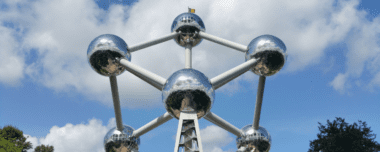
France
As France demands a cloud-first approach, 5G sites and antennas are multiplying rapidly there. That represents real opportunity for Irish firms.

Germany
Leading the way in spectrum allocation, Germany is focusing on the connectivity needs of industry, while also seeking to make 5G available to everyone.

Italy
Italy is vigorously pursuing digitalisation and cloud adoption, with significant funding for extensive infrastructure and service development.

Netherlands
While opportunity abounds in this tech-savvy market, regulatory processes may slow down the growth of 5G.

Spain
As Spain seeks to bring ultrafast connectivity to everyone in the country, there is keen take-up of cloud services in business and industry.



